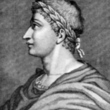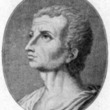The Aeneid
(Libby/OverDrive eBook, Kindle)
Available Platforms
Description
Excerpt
Similar Titles From NoveList
Published Reviews
Booklist Review
Virgil (70-19 BCE) died without having polished his epic consolidation of the myth of the Trojan founding of Rome. Some lines are incomplete, and the dense Latin is legendarily a rack for the student's understanding. Though elegant, The Aeneid is also rough, then, and elegance and roughness abound in Ferry's completion of his work with Virgil (he published a version of the Eclogues in 1999, of the Georgics in 2005). If elegance suits the personae of gods, heroes, and monarchs, roughness answers the brutal fighting that bulks larger in The Aeneid than in its primary artistic model, The Iliad. The early books recall The Odyssey, too, when Aeneas recounts his party's journey from Troy to Carthage, while the romance of Aeneas and Carthage's queen, Dido, is a much more substantial episode than Odysseus' engagement with Calypso. The Aeneid is entirely distinctive, of personal and literary rather than popular and oral origins, a cornerstone of not just culture but also of calculated art. Ferry conveys its power even more than its majesty.--Olson, Ray Copyright 2017 Booklist
Library Journal Review
More than the Iliad and Odyssey of Homer, The Aeneid of the Roman poet Virgil shapes Western literature and cultural identity, our idea of the hero and the nation. National Book Award-winning poet and translator Ferry (emeritus English, Wellesley Univ.; Bewilderment: New Poems and Translations), takes up the Aeneid with engaging results. His previous translations include Horace's Odes and Virgil's Eclogues and -Georgics. -Virgil's stately but vigorous dactylic hexameter is difficult to render in natural English. Ferry prefers iambic pentameter blank verse to achieve the heroic effects. This translation holds its own with the verse renditions of John Dryden, C. Day Lewis, Allen Mandelbaum, and Robert Fagles. Ferry's diction is accurate in tone and pitch, if not always literal. For closer, word-for-word translations, one should consult those of Elaine Fantham, or the prose versions of H. Rushton Fairclough and David West. The chief criticism is the lack of a glossary of names and places, making it challenging at times for those not familiar with the material to keep up with the array of characters. VERDICT An elegant and fluent version highly recommended for serious general readers.-Thomas L. Cooksey, formerly with Armstrong Atlantic State Univ., Savannah © Copyright 2017. Library Journals LLC, a wholly owned subsidiary of Media Source, Inc. No redistribution permitted.
Booklist Reviews
Virgil (70–19 BCE) died without having polished his epic consolidation of the myth of the Trojan founding of Rome. Some lines are incomplete, and the dense Latin is legendarily a rack for the student's understanding. Though elegant, The Aeneid is also rough, then, and elegance and roughness abound in Ferry's completion of his work with Virgil (he published a version of the Eclogues in 1999, of the Georgics in 2005). If elegance suits the personae of gods, heroes, and monarchs, roughness answers the brutal fighting that bulks larger in The Aeneid than in its primary artistic model, The Iliad. The early books recall The Odyssey, too, when Aeneas recounts his party's journey from Troy to Carthage, while the romance of Aeneas and Carthage's queen, Dido, is a much more substantial episode than Odysseus' engagement with Calypso. The Aeneid is entirely distinctive, of personal and literary rather than popular and oral origins, a cornerstone of not just culture but also of calculated art. Ferry conveys its power even more than its majesty. Copyright 2017 Booklist Reviews.
Library Journal Reviews
More than the Iliad and Odyssey of Homer, The Aeneid of the Roman poet Virgil shapes Western literature and cultural identity, our idea of the hero and the nation. National Book Award-winning poet and translator Ferry (emeritus English, Wellesley Univ.; Bewilderment: New Poems and Translations), takes up the Aeneid with engaging results. His previous translations include Horace's Odes and Virgil's Eclogues and Georgics. Virgil's stately but vigorous dactylic hexameter is difficult to render in natural English. Ferry prefers iambic pentameter blank verse to achieve the heroic effects. This translation holds its own with the verse renditions of John Dryden, C. Day Lewis, Allen Mandelbaum, and Robert Fagles. Ferry's diction is accurate in tone and pitch, if not always literal. For closer, word-for-word translations, one should consult those of Elaine Fantham, or the prose versions of H. Rushton Fairclough and David West. The chief criticism is the lack of a glossary of names and places, making it challenging at times for those not familiar with the material to keep up with the array of characters. VERDICT An elegant and fluent version highly recommended for serious general readers.—Thomas L. Cooksey, formerly with Armstrong Atlantic State Univ., Savannah
Copyright 2017 Library Journal.Reviews from GoodReads
Citations
Virgil., & Dryden, J. The Aeneid . Duke Classics.
Chicago / Turabian - Author Date Citation, 17th Edition (style guide)Virgil and John Dryden. The Aeneid. Duke Classics.
Chicago / Turabian - Humanities (Notes and Bibliography) Citation, 17th Edition (style guide)Virgil and John Dryden. The Aeneid Duke Classics.
Harvard Citation (style guide)Virgil. and Dryden, J. (n.d.). The aeneid. Duke Classics.
MLA Citation, 9th Edition (style guide)Virgil, and John Dryden. The Aeneid Duke Classics,
Copy Details
| Collection | Owned | Available | Number of Holds |
|---|---|---|---|
| Libby | Always Available |




































